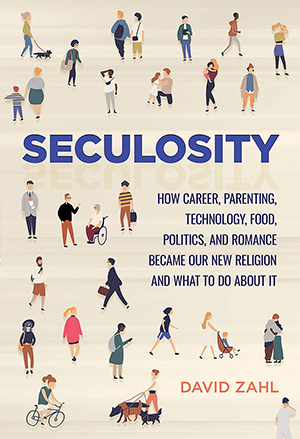RUD: Our readers may not be familiar with your organization, Mockingbird. Would you give us a description of the site and how the organization came to be?
ZAHL: There’s no real elevator pitch for Mockingbird. It’s something that happened kind of organically. We’ve been around for 12-13 years. And I think that maps pretty closely onto certain online communities that became multi-contributor websites, then became conferences, then moved into print journals and things like that. We occupy an intersection point of religion and culture, representing, I suppose, an attempt to rehabilitate Christianity in some small way. But you’d see a similar trajectory within the video gaming community, with Kill Screen, or music-wise with Pitchfork to a much larger degree. Some of these things have blown up like Vice, and some of them remain smaller. At the time, it was like, I don’t know what we’re doing, but let’s just keep it going. And now with the way social media has emerged as a way to absorb new media, I like to say Mockingbird is a media platform for connecting all aspects of everyday life with capital-G Grace, the kind we believe comes from God. So to that end, we host conferences, we have a very active website, an app, a print journal, podcasts. And we’ve got lots and lots of contributors, so it’s almost as much a community as it is a platform.
RUD: How did you come to the point where you wanted to write this book, Seculosity? Have you had it in the back of your mind this whole time? Or did something more recently act as the catalyst for it?
 ZAHL: No, it’s been bubbling for a while. As someone who grew up going to church but wasn’t involved in any of the culture or trappings a lot of people associate that with and instead went to very progressive “secular” schools, I was increasingly struck by the way that the rest of life had come to resemble a sort of bad experience of religion. I’d hear young people elsewhere saying they were burnt out on religion, because it was just rules, rules, rules–nothing but demand, oppression, suppression, I just want to run away, etc. There was nothing comforting or sustaining about it. And then there’s also this guilt aspect to it, a real condemnation or accusation, where people walk around just feeling terrible about themselves, like they weren’t enough. That’s what I would call a toxic experience of religion, but it’s common to a lot of people who grew up, especially in the 90s. Anyway, I was starting to notice the same dynamics at work in the wider culture around food and parenting and romance, that the anxiety around these things had ballooned to an existential level, or what to me felt religious. There was so much righteousness at play. That’s a religious word, but it’s really the only one that fits. Meaning, there’s so much righteousness involved today in how you diet and parent. Yet these communities are often filled with people that would never want to be seen, as you know, religious. So I felt like someone who had survived that culture and come out on the other side and had seen what was good about religion–Christianity in particular–and maybe had something positive to contribute. That I might be able to name the anxiety for what it was–not to mention the exhaustion, the loneliness, and the anger–while also giving some insight from a long tradition of helping people deal with their guilt and shame, both effectively and counterproductively.
ZAHL: No, it’s been bubbling for a while. As someone who grew up going to church but wasn’t involved in any of the culture or trappings a lot of people associate that with and instead went to very progressive “secular” schools, I was increasingly struck by the way that the rest of life had come to resemble a sort of bad experience of religion. I’d hear young people elsewhere saying they were burnt out on religion, because it was just rules, rules, rules–nothing but demand, oppression, suppression, I just want to run away, etc. There was nothing comforting or sustaining about it. And then there’s also this guilt aspect to it, a real condemnation or accusation, where people walk around just feeling terrible about themselves, like they weren’t enough. That’s what I would call a toxic experience of religion, but it’s common to a lot of people who grew up, especially in the 90s. Anyway, I was starting to notice the same dynamics at work in the wider culture around food and parenting and romance, that the anxiety around these things had ballooned to an existential level, or what to me felt religious. There was so much righteousness at play. That’s a religious word, but it’s really the only one that fits. Meaning, there’s so much righteousness involved today in how you diet and parent. Yet these communities are often filled with people that would never want to be seen, as you know, religious. So I felt like someone who had survived that culture and come out on the other side and had seen what was good about religion–Christianity in particular–and maybe had something positive to contribute. That I might be able to name the anxiety for what it was–not to mention the exhaustion, the loneliness, and the anger–while also giving some insight from a long tradition of helping people deal with their guilt and shame, both effectively and counterproductively.
RUD: Do you feel like this book has kind of become the culmination of what you’ve created with Mockingbird? Is this book the fruition for you of what Mockingbird has become?
ZAHL: A little bit? I mean, maybe I’m being naive, but I don’t want to be synonymous with Mockingbird. And Mockingbird didn’t publish this book. That said, I did start the project by looking in the Mockingbird archive of articles to see what I had done that I was most proud of and I felt were my most solid contributions. Of course, there’s a big difference between writing for the web and writing for print. I mean, I had heard other writers say that you haven’t actually said something until you’ve said it in print. And while I don’t necessarily believe that, I definitely wanted to see if I could weave something together that would fit a book length. So I set out to find the red threads throughout my writing that had gained the most traction.
Still, I’m very wary to see it as a culmination or mission statement for Mockingbird. I hope I have more to say at some point, and that over its first decade or so Mockingbird has said a whole lot more than can be contained in these pages. But, also, it’s not not that. People who’ve read Mockingbird for a long time will recognize significant portions of the book. Fortunately, that’s not that many people! And even if it were, blogging sometimes reminds me of preaching in that no one remembers a sermon the week after. So, this was not an attempt to do a greatest hits. I definitely identified a theme and ran with it. From there, I wanted to explore how I’d been shaped by this idea of seculosity, how and to what extent it’s shaped what’s going on in the world around me. And then, I had to figure out how to present the material in as palatable form as I could. The book is consciously meant to be more accessible than Mockingbird writing.
RUD: Yeah. The issue of accessibility is something that is prominent these days. You intentionally use largely “secular” sources throughout your book, instead of relying solely on religious texts. What is it about this book that made you want to make it more accessible, so anyone can get something out of it instead of just making it a “Christian”-friendly book?
ZAHL: I’ve been writing long enough to know that I can write for a very specific audience and get a whole lot of “likes.” People tend to get rabidly interested if you pen a polemic, or a rant of some kind. Maybe the internet has conditioned us to expect these sorts of hot-take things–I don’t know. But in my experience, it’s much harder to do something that’s broad yet still says something. For myself, over the years, I’ve really tried to discipline myself never to write for a specifically Christian audience. I’m not even sure I know what that means at this point. I mean, I’m a Christian, but I still pull my pants on one leg at a time, I struggle with all sorts of things that people struggle with. To say that you’re a Christian, to a lot of people, implies that you’re static and never changing or never questioning. Which is ironic, since I’ve found that under religious umbrellas, the opposite is true — that you cannot run away from some of that questioning. It’s one of the wonderful parts of being religious, but also one of the most exhausting parts–that you can’t check your mind or heart “at the door” but are always asking “do I believe this?”. Maybe other people will disagree.
In terms of the mechanics, though, I think I spent a long time–and I wasn’t fully aware of it–trying to impress people with my writing. Or, I would write with certain people in mind, hoping to garner the respect of such-and-such audience in my head. The process of growing as a writer is trying to figure out what your own voice is, and trying to strip away those projections, something like “unless it’s really dense hard to read, it’s not good.” Having grown up in higher education and around people with PhDs, there’s definitely a bias that if something is popular, it must therefore be stupid. Truth be told, a lot of my favorite writers get simpler as they get older–look at Dylan’s early work versus what he does now. Or Springsteen. You can look at TS Eliot even, or someone like Joni Mitchell. Their later output is less byzantine than their earlier stuff and I don’t think that’s an accident. Anyways, I had an editor on this book (Tony Jones) who really helped me there. He’d ask, “what is it that you’re really trying to say? Who are you trying to communicate with?” And the answer was, I’m trying to communicate with as many people as possible, because I think the stuff that I’m talking about is fairly universal: the desire to be enough, to secure some sense of righteousness, or doing enough to get noticed, and so on.
RUD: I’m sure you’ve answered this a few times. By a “few”, I mean, every interview. What is “seculosity”?
ZAHL: Seculosity is a combination of the words “secular” and “religiosity.” It’s a neologism that is supposed to capture religious sentiment, feeling, devotion, or energy that is directed at earthly rather than heavenly objects. Or you could say horizontal rather than vertical objects. I didn’t want to use the phrase “secular religiosity,” because, partly, that’s a mouthful. “Seculosity” is kind of a musical sounding word. I almost called it Seculanity, but that sounded too much like insanity. But it was almost important to me that I found a word that didn’t ascribe belief to people, i.e., “Hey, guess what? You’re religious, even though you don’t believe in God!” That’s pretty patronizing. And yet, I wouldn’t be true to the material, if I didn’t suggest the feelings and behaviors and habits follow a very religious pattern, albeit without a deity or anything supernatural, at least consciously. So I made up a word that, to my ear, split the difference. It was a risk and, needless to say, a hard sell for publishing companies.
Meaning, every publisher who liked the book also wanted to change the title, except for the people that finally published it [Fortress]. A few months in, I think I can safely say that the title has played to my advantage. There’s a lot of us-versus-them mentality out there, and seculosity’s something that binds people together. It helps Christians think that maybe this religion thing isn’t as weird as we sometimes think it is. And maybe it gives people who hate the church or organized religion some insight as to why someone actually might find some comfort there. I’m trying to advocate for a gracious understanding of the world.
RUD: There’s a central idea that weaves in and out of the book: performancism. You define it as “the assumption, usually unspoken, that there is no distinction between what we do and who we are.” Why do you feel like this is at the core along with control? And what is it doing to us as a result?
ZAHL: It’s not an idea that takes much explanation, because everyone knows what it’s like to lose their job and then not know who they are, or lose a relationship and wonder what on earth is going on. And no one can avoid the shipwrecks and heartaches of life, so performancism tends to amplify our anxiety a great deal. I think performancism is also what social media more or less runs on, as in “I AM these things about me.” You have to reduce yourself in order to make yourself understood on a social, technological platform. There’s just no space for a lot of vulnerability and a lot of weakness and a lot of silliness that characterizes life–no space for internal conflict, for I’m this thing today and that thing tomorrow. Performancism sifts us into a very specific set of attributes and then makes us extremely anxious, because we have to make sure we’re excelling in those select arenas. Everything becomes a score sheet. Performancism is alluring, because it seems to offer some control. “If I can just do such and such then I will be such and such.” And it allows you to dodge, for a while, the question of “who am I?,” which is such a confusing and difficult question. When supercharged by technology in the way that we have right now, I think that we set ourselves up for endless amounts of comparison, and therefore despair, because everyone thinks that they’re the only one that’s not, you know, performing enough. At least, that’s my experience of people.
RUD: So you’ve just touched on this a little bit, but I was wondering how the distinction between what we do and who we are differed from what we call identity or identity politics today. It’s less about “doing” and more about defining our “being,” our identity in society. How would you say your conception differs?
ZAHL: Well, off the bat, it’s very hard to criticize identity politics without sounding like an asshole, so bear with me. To me “identity politics” refers to what happens when we boil people down to one or two specific attributes, usually their gender, sexual identity, or race. Those are the big three. And while those are immensely important categories–and if you’ll allow me to indulge in identity politics for a second, I realize it’s very easy for me as a straight, white guy to say this–but while those are important aspects of a person’s identity, they’re seldom the most interesting parts, and never comprehensive or what I would call ‘ultimate.’ For instance, in terms of falling in love, I don’t want to be loved because of my demographic ‘givens.’ Sure, I don’t want those things to rule me out. But I don’t want someone to just love the fact that I am a, you know, 40-year-old college-educated man from New York City, I want them to love Dave. In my heart of hearts, I want someone to relate to me as an individual with all sorts of sometimes-wonderful, sometimes-conflicting characteristics.
Anyway, when it comes to performancism and identity, you quickly come across this idea that you and I are self-made or self-invented–especially in consumerist America. Taken to its endpoint, you get some admittedly super fascinating stuff, where ‘who I am’ is sort of an art project, a la David Bowie or Madonna. But again, at the end of the day, what I want is to be loved and not primarily for what I do, because I’m going to stop doing whatever it is one day. Which is another way of saying that when you get into self-invention, your identity becomes performative. Say you identity first and foremost as an American man, for example, and then you have people, now, questioning if you’re “American enough”–or “man enough.” You start getting into a sort of competition over purity. Who is the most American? The most male? If not tempered by love, these sorts of identity markers oppress us the more monolithic they become.
Yet that’s not to disparage identity politics altogether. You can’t escape these things–or to the extent you can is probably evidence of an identity of its own. We all have shorthand for how we interpret the world and other people, but in terms of seculosity, I’m interested in what ties people together. The book is trying to focus on that. I was worried, at first, that I was writing a book that’s all about a specific sort of upper middle class anxiety, which has been a criticism of Mockingbird throughout the years. But then everything I read, it kept coming around to a resounding No. People on North Dakota farms are dealing with this same performancism, and people in retirement communities are feeling this. It’s incredibly widespread.
RUD: The book is divided up into various manifestations of seculosity in everyday life from parenting to politics. How did you go about picking which ones you were going to cover? Because on some level, it’s pretty much performance and control all the way down.
ZAHL: I was interested in the more extreme expressions within the broadest confines. The parenting world, for example, within which I am also firmly entrenched at present, is something where people express an enormous amount of anxiety. Anyone I talked to about how parenting has become a religion, their lights came on immediately. The real criteria for the topics I tackled in the book was that it had to apply to me. In order to avoid speaking ‘down’ or even from the outside-looking-in, I had to be someone who was in the middle of whatever I was talking about. Plus, I was drawing on research I’ve been doing over eight or nine years. Doesn’t mean I wrote about everything. I tried to hone in on the ones that were broadest. Geek culture or something like that, I’m ensconced in that too, but that narrows things down a little more than I wanted this book to do.
Basically, I realized early on that this was a subject where I had the potential to come off as being above the phenomenon I was describing, as someone who’s a professional Christian or something like that. I didn’t want that tone, because I don’t respond to books that have that tone. There’s some people who are gifted at it, you know, who are really good at ranting. But I don’t think that’s my gift. So everything that I talked about describes me. Which I hope means that I was able to talk about things with a degree of humility, having personally felt the sting of whatever form of seculosity I am speaking about. There are things like sports, for example, which I don’t really follow, and I’m sure if I wrote about sports as a target of seculosity, there might be a slight condescension that comes across.
RUD: Which chapter was the hardest to research, write, and process for yourself?
ZAHL: The hardest to write was the politics chapter.
RUD: I could see that. It was the hardest one for me to read and process.
ZAHL: It is such a hot potato. How do you thread this line? We are all so sensitive about politics right now. Everyone is dying to know where everyone else “stands” on things. In fact, it feels sacrilegious to tell someone that you’re not that political of a person. You’ll be thrown into the outer darkness or something. But given the sensitivity, I knew I couldn’t not write about politics. That’s simply where the culture is right now. It’s where so much of the spiritual energy of our current era is directed. I mean, politics is where you have people thinking and talking most explicitly about saviors, about ideological purity, about immortality, and yes, even end times. There’s so much us versus them. Once you’re in one of these ideological enclaves, people are just constantly devouring each other and throwing each other out because they’re not committed enough or they’ve said something that doesn’t jive with the dogma. It’s a lot like fanatical forms of religion. So I knew I had to write about it, but that it would be a challenge. And it was hard. My favorite compliments I’ve gotten on the book is that I managed to thread the needle fairly well.
RUD: So what subject did you want to cover, but had to cut or you just knew you couldn’t add?
ZAHL: I think I would have liked to have written something about the seculosity of celebrity. Because I do care about celebrities and artists, and I like TV and movies and rockstars. It’s a place where we see a lot of scapegoating behavior. We do it with politicians, but we really do it with celebrities. We project all sorts of things onto them and they’re often the focus of the temptation of, you know, vicarious redemption. There’s so much religiosity around celebrity, so much worship, veneration, and then hatred and condemnation. That could have been a good and relatively fun addition.
RUD: How many pages do you think you would have had to dedicate to Kanye?
ZAHL: I mean, he would be right in there. So would Beyonce. Talk about a modern saint. I mean, if you criticize her, you better get ready to get burned at the stake. No kidding.
RUD: I wanted to share a couple of quotes and then have you just riff on each a little bit. The first one of them comes from the “seculosity of romance:” “Love without vulnerability is not really love at all. It’s more like mutual objectification, where the other person serves as a canvas upon which we project not only our idealized selves, but our spiritual and emotional yearnings.”
ZAHL: Well, what I mean by “object” is not necessarily sex object but when you turn someone else into a tool to enhance your own righteousness, your own enoughness. And it’s impossible not to do when you’re falling in love. It’s part of the thrill. You think, “oh, my goodness, this person’s absolutely amazing.” Then you get to know them, and you’re like, they’re actually amazing–but in different ways than you originally thought. And some of the things you thought at first were amazing are actually the evidence of some wreckage. Love is what begins in that moment, I’m convinced. By that I mean sustaining love. Because so often when it comes to relationships, we are looking for someone to complete us, we’re looking for salvation. I mean, how many pop songs do I know that are just like, “save me, I’m looking for you to save me.” Maybe they’re trying to talk to God AND the person but they’re really just talking to the person: ‘I need some purpose in my life, I need some acceptance, but what I really need is I need to be saved from myself and be taken out of myself and given something that I do not have.’ And so we turn the other person into an object, whose primary purpose in life becomes our own fulfillment, even if we don’t even think of it that way. And then you get married and you live with a person long enough you’re like, ‘Oh my gosh, all the things I thought I liked about you, I don’t, and all the things that I didn’t like about you, I love,’ and that’s a really beautiful process. You realize perhaps that you needed to feel like you were enough by having someone that looked like x, y, or z. And she needed to feel like she was enough for this reason. Come to find out, neither of us is enough. But we’re stuck with each other. And that’s kind of beautiful.
RUD: And the other quote I wanted to bring up is about politics. “Indeed, when we get religious about politics in the ways I am describing it has a way of actually undermining the significance of the issues themselves—we come to care about a thing less for itself and more because of how it makes us feel and how it affects our belonging in a given political tribe.”
ZAHL: I think that that’s going on a lot more than people are willing to admit. It doesn’t mean we don’t care about the issues. But the issues themselves take a backseat to the belonging they deliver us, the love we get for them. And that’s a tough pill to swallow. Because usually what folks hear is you devaluing whatever righteous cause that is at stake. But when I see people falling all over themselves to make sure that everyone knows how against such-and-such they are–as if it was ever in question–I can’t help but think there’s an emotional payoff involved. There’s a justification aspect to that kind of behavior. Which makes it (much) more difficult to talk about the issues themselves. Because again, it’s not just the issue that’s at stake, it’s our belovedness, or our identity. And people get really upset when they think that you’re threatening their acceptance.
RUD: What are you working on currently? And where can readers find your work?
ZAHL: I’ve actually been dealing with a little bit of writer’s block since the book came out. I’m a little sick of hearing myself talk right now and I’m not sure where to begin. I have a pretty solid idea for the next book, which I’m not going to talk about yet.
I’m doing a lot more podcasting. Because that’s where people seem to be living right now, more and more. Which is kind of funny, cause the rise of podcasts probably has a lot to do with the cult of productivity I talked about in the book–of people wanting to be occupied in a constructive way while they’re commuting. We aren’t really listening to music in the same way because it feels like entertainment–which is a lot harder to justify. Whereas listening to a podcast feels like you’re educating yourself or improving yourself. But I’m willing to exploit those dynamics. [Chuckles] I noticed this recently about myself, like, why do I feel guilty somehow when I’m listening to music on a commute? And I’m not like, improving? Yeah. What’s that about? Because I really love music. In fact, I do a music podcast called The Well of Sound which is a ton of fun. The Mockingbird cast, however, is my main podcast, and Mockingbird (www.mbird.com) is where most of my stuff is published. Seculosity is in bookstores.







